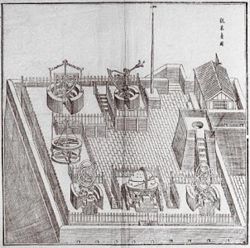Imperial Astronomical Service

The imperial astronomy office or Imperial Astronomical Institute Chinese 欽天監 , Pinyin Qintianjian , W.-G. Qin1tian1jian1 was a department of the extremely important Ministry of Rites (Ministry of Culture; Chinese 禮部 , Pinyin Li3bu4 ) in the imperial government apparatus under the last dynasty.

The observatory (observatory) was built by the Yuan Dynasty in the 13th century and initially operated by Arab Muslims . From the 17th century onwards, it was always directed by a Muslim astronomer. The observatory consisted of several astronomical instruments mounted on an elevated platform east of the Forbidden City in Beijing . Much was attached to the observatory, during the period of which the importance of the Ming Dynasty declined, mainly because it was not very precise in its observations.
The decline was only stopped when Jesuit astronomers came from Europe and were hired as heads of the observatory by the late Ming emperors and also by the new Qing dynasty emperors.
When the Jesuits took over in the 17th century, the observatory's only real job was to calculate and publish the Chinese calendar every year . This was a job that fell to the imperial court as the calendars were of great importance. In the political relationship with tribute acts, it was also important that the neighboring countries use the Chinese calendar. It was an expression of the sovereignty of the Chinese Empire. Much reputation was associated with it when the calendar calculations of z. B. Solar and lunar eclipses were correct.

When the Catholic missionaries came to Beijing, the quality of the calculations had deteriorated significantly. Therefore the emperor saw that the western astronomical methods were superior and that he had to give them the task of doing the calendar calculations from scratch. This led to conflict and resentful Chinese nationalist officials took over the administration for a while in the 1660s and tried to incite missionaries, having Father Adam Schall , the director of the observatory, incarcerated and sentenced to death. (The death sentence was overturned, Father Schall was released, but died before he was fully rehabilitated .)
After this interlude , the Jesuits were fully rehabilitated and carried out their calendar work to the full satisfaction of the emperor as long as they were active at the observatory. In 1774 the order of Jesus was dissolved and after a few years a Lazarist congregation took over the work. Gradually, like so much else in the late Qing Dynasty, the work deteriorated. Until 1912, when the Qing Dynasty collapsed, the Department of Astronomy was under the Ministry of Public Education .
The astronomers' observation deck has been preserved in modern Beijing and is one of the city's landmarks. (See Old Beijing Observatory )
Jesuits (SJ) and Lazarists (CM) and senior positions in the Imperial Astronomical Office during the Qing Dynasty
-
Title:
- (for the top leader :)
- Zhang Qintianjian shiwu (Director title - Father Schall's title until the end of the system)
- Zhili lifa (calendar administrator), title in use after P. Schall and until the title was discontinued in 1725
- Jianzheng (director), bureaucratic upgrading of titles by zhili lifa 1725
-
Title:
-
- (lower levels :)
- Jianfu (vice director, created 1718 and upgraded in 1753), there were up to four, at times five jianfu at the same time
- You jianfu (Right Vice Director, after 1753), higher rank than jianfu
- Zhou jianfu (left vice director, after 1753), slightly higher rank than you jianfu
-
- Adam Schall von Bell SJ (汤若望) - Zhang Qintianjian shiwu 1645–1664: (interruption during the calendar dispute )
- Ferdinand Verbiest SJ (南怀仁) - Zhili lifa 1669–1688
- Tomé Pereira SJ - unofficially Zhili lifa (for Grimaldi) 1688–1694
- Antoine Thomas SJ - unofficially Zhili lifa (for Grimaldi) 1688–1694
- Claudio Filippo Grimaldi SJ (闵 明 我) - Zhili lifa (appointed 1688, but never was in China) 1694–1711
- Kilian Stumpf SJ 1711–1720 - Zhili lifa
- Ignatius Kögler SJ Zhili lifa / Jianzheng 1720–1746
- André Pereira SJ - Jianfu 1729-1743
- Augustin von Hallerstein SJ - Jianfu 1724–1746, Jianzheng 1746–1774
- Anton Gogeisl SJ - Jianfu 1746–1753, Zuo jianfu 1753–1771
- Félix da Rocha SJ - jianfu 1753, you jianfu 1753-1771, Zuo jianfu 1771-1774, jianzheng 1774-1781
- José d'Espinha SJ - You jianfu 1771–1774, Zuo jianfu 1774–1781, Jianzheng 1781–1787
- André Rodrigues SJ - You jianfu 1774-1781, Zuo jianfu 1781-1787, Jianzheng 1787-1795
- José Bernardo de Almeida SJ - You jianfu 1781–1787, Zuo jianfu 1787–1795, Jianzheng 1795–1805
- Alexandre de Gouvea (former Jesuit) - You jianfu 1787–1795, Zuo jianfu 1795–1806, Jianzheng 1806–1808
- Nicolas Raux CM - You jianfu 1795-1801
- Domingos-Joachim Ferreira CM - You jianfu 1801-1806, Zuo jianfu 1806-1808, Jianzheng 1808-1823
- José Ribeiro-Nuñez CM - You jianfu 1806–1808, Zuo jianfu 1808–1823, Jianzheng 1823–1826
- Verissimo Monteiro da Serra CM - You jianfu 1808-1823, Zuo jianfu 1823-1826
- Gaetano Pires-Pereira CM - You jianfu 1823-1826
literature
- Stanislav Juznic: Letters from Augustin Hallerstein, an eighteenth century jesuit astronomer in Beijing. (Letters from Augustin Hallerstein, an 18th century Jesuit in Beijing) In: Journal of Astronomical History and Heritage. 11 (2008) 3, pp. 219-225.
- Hu, Fan 胡 梵 from Xi'an 西安: Islam in Shaanxi: Past and Present. With an investigation into the Islamic-Christian dialogue in times of globalization and ecumenism. Inaugural dissertation to obtain a doctorate from the Philosophical Faculty of the Rheinische Friedrich-Wilhelms-Universität zu Bonn submitted by Hu, Fan 胡 梵 from Xi'an 西安, PR China (陜西 伊斯蘭教 歷史 與 現狀, ── 及 對 在 全球化 及合一 運動 時代, 伊斯蘭教 與 基督教 對話 之 探討, 胡 梵 著), Bonn 2008, p. 61ff (2.6.4 Comparison with Christian proselytizing) (online)
Coordinates: 39 ° 54 ′ 21.8 " N , 116 ° 25 ′ 40.7" E